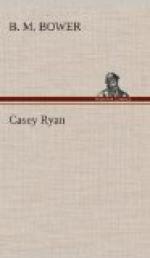He made camp just out of sight around a point of rocks from the smoke, stretching the canvas tarp which had floored the tent to make shelter between boulders. He changed his clothes, dressing himself carefully in the white flannel trousers, blue-and-green striped silk shirt, tan belt, white shoes and his old Stetson tilted over his right eye at the characteristic Casey angle. He was taking it for granted that an Indian camp lay under that smoke, and he knew Indians. Inquisitiveness would shut them up as effectively as poking a stick at a clam; but there were ways of coaxing their interest, nevertheless, and when an Indian is curious you have the trumps in your own hand and it will be your own fault if you lose.
Casey’s manner therefore was extremely preoccupied when he led a suddenly limping William up the gulch and past a stone hut with a patched tepee alongside it. A lean squaw stood erect before the tepee and regarded him fixedly from under the shade of a mahogany-colored hand, and when Casey came closer she stooped and ducked out of sight like a prairie dog diving into its burrow. Casey paid no attention to that. He knew without being told that he was under close scrutiny from eyes unseen; which was what he desired and had prepared for.
The spring, as he had guessed, was above the camp. He threw a rock at two yammering curs that rushed out at him, and drove them back with Caseyish curses. Then he watered William at the trampled spring, made himself a smoke, and went back down the gulch. Opposite the tepee the squaw stood beside the trial. Casey grinned amiably and said hello.
“Yo’ ketchum ’bacco? My man, him heap sick. Mebby die. Likeum ’bacco, him.” The squaw muttered it as if she would rather not speak, but had been commanded to beg tobacco from the stranger.
“Sure, I got tobacco!” Casey’s tone was a bit more friendly than before. He pulled a small red can from his shirt pocket, hesitated and then tied William to a bush. “Too bad your man sick. Mebby I can help him. He in here?”
The squaw gestured dumbly, and Casey stooped and went into the tepee.
Inside it was so dark that he stood still just within the opening to get his bearings. This happened to be very good form in Indian society, and we will assume that Casey lost nothing by the pause. He dimly saw that a few blankets lay untidily against the tepee wall and that an old Indian was stretched upon them, watching Casey with one black eye, the other lid lying in sunken folds across the socket. Casey was for once in his life speechless. He had not expected to walk straight into the camp of Injun Jim. He had thought that of course he would have to go on to Round Butte and glean information there, perhaps; if he were exceptionally lucky he would meet Indians who would tell him what he wanted to know. But here was a one-eyed buck, and he was old, and he lived in the Tippipahs,—Injun Jim by all description.




